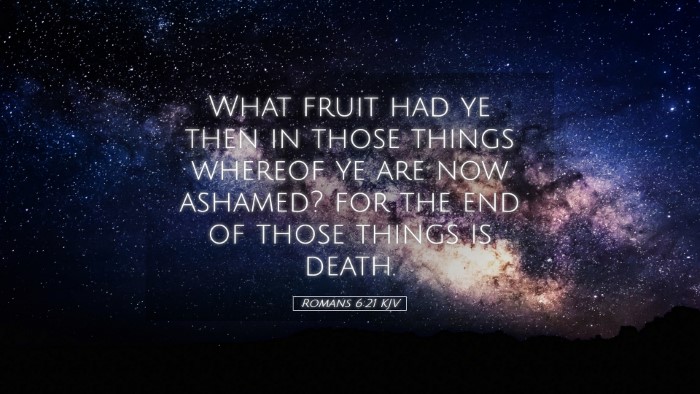Old Testament
Genesis Exodus Leviticus Numbers Deuteronomy Joshua Judges Ruth 1 Samuel 2 Samuel 1 Kings 2 Kings 1 Chronicles 2 Chronicles Ezra Nehemiah Esther Job Psalms Proverbs Ecclesiastes Song of Solomon Isaiah Jeremiah Lamentations Ezekiel Daniel Hosea Joel Amos Obadiah Jonah Micah Nahum Habakkuk Zephaniah Haggai Zechariah MalachiRomans 6:21
Romans 6:21 KJV
What fruit had ye then in those things whereof ye are now ashamed? for the end of those things is death.
Romans 6:21 Bible Commentary
Commentary on Romans 6:21
Verse: "What fruit had ye then in those things whereof ye are now ashamed? for the end of those things is death."
Contextual Analysis
Romans 6:21 occurs within a profound theological discourse by the Apostle Paul regarding the nature of sin and grace. The preceding verses outline the believer's transformation through union with Christ, emphasizing the transition from being slaves to sin to becoming servants of righteousness. This particular verse invites reflection on the consequences of a life lived in sin versus one rooted in the Spirit.
Matthew Henry's Perspective
Matthew Henry emphasizes the profound implication of shame associated with past sins. He notes that shame arises from the realization of one’s former pursuits that led to spiritual death and separation from God. Henry states that believers must reflect on the fruits of their past actions to appreciate the totality of salvation. Recognizing the emptiness and despair resulting from a sinful lifestyle highlights the necessity for repentance and a commitment to righteousness.
Albert Barnes' Interpretation
Albert Barnes elaborates on the concept of 'fruit' in this verse. He explains that 'fruit' refers not merely to the immediate pleasures of sin but to the long-term consequences and ultimate results. Barnes points out that seeking pleasure in sin ultimately yields results that lead to spiritual death and separation from the life of God. He encourages believers to ponder what genuine fruit is produced in their lives and to contrast that with the fleeting pleasures of sin, which lead to shame and regret.
Adam Clarke's Exegesis
Adam Clarke provides an in-depth examination of the term 'ashamed' in Romans 6:21. He highlights that the shame of sin is a crucial element of the Christian experience, pointing towards the need for repentance. Clarke notes that while believers may experience past shame, the grace of Christ offers redemption and renewal. The verse calls Christians to serious reflection on their past lifestyles, urging them to recognize how those lifestyles stand in stark contrast to a life lived in communion with Christ.
Theological Implications
This verse serves as a powerful reminder of the serious nature of sin. The theological implications echo throughout the epistle, noting that the ramifications of sin are grave. Believers are implored to consider their fruits—actions, thoughts, and motivations—and evaluate if they honor God. The call to reflection leads to a greater understanding of grace and the transformative power of Jesus Christ.
- Reflection on Sin: It is essential for believers to confront their past sins honestly, acknowledging the regrets that come with them.
- The Promise of Redemption: This verse highlights that while past sins lead to shame, God’s grace is sufficient to transform our lives.
- Contrast of Outcomes: Just as sin leads to death, life in Christ brings life and fruitfulness, providing clarity on the importance of our choices.
Practical Applications
In pastoral ministry and personal discipleship, Romans 6:21 invites critical teaching on the gravity of choices made outside of Christ. Here are practical applications for believers:
- Self-Examination: Encourage regular self-reflection among congregants to assess their spiritual fruit and relationship with God.
- Preaching on Grace: Teach the message of grace alongside the importance of sanctification, emphasizing that while we all have a past, we also have a new identity in Christ.
- Community Accountability: Foster small groups or discipleship relationships where individuals can share struggles openly, find support, and grow together in righteousness.
Conclusion
Romans 6:21 serves both as a caution against the deceptive allure of sin and as an encouragement towards the abundant life found in righteousness through Christ. The insightful interpretations of Henry, Barnes, and Clarke collectively underscore the importance of understanding the consequences of our actions and the transformative power of God’s grace. As pastors and scholars reflect on this text, they are reminded of the necessity of continually guiding believers toward a fruitful life that glorifies God.


